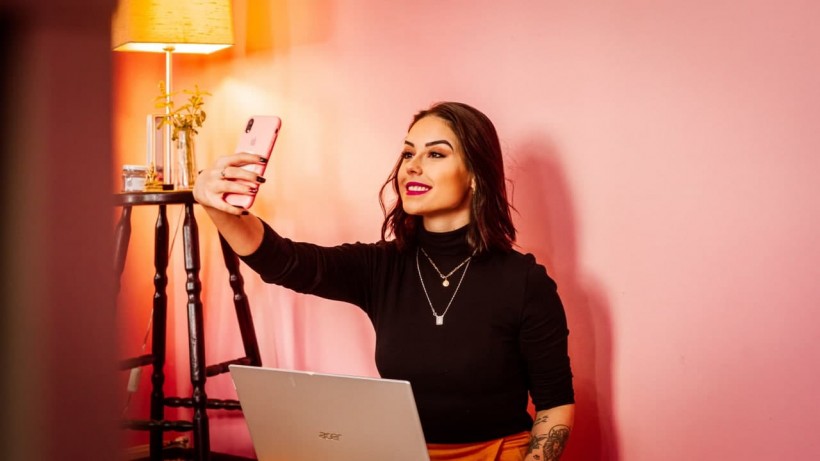From 2012 to 2019, the global skincare market grew by 41.8%, driven by a growing preference for skincare over makeup by Gen Z. Many Gen Z women are forgoing makeup altogether in favor of popular skincare products like Mario Badescu's rosewater facial spray, Burt's Bees lip balm, and Glossier's Cloud Paint.
The pandemic has raised further interest in skincare among this demographic, says Former L'Oreal executive Nicolas Krafft, adding that they now have additional time at home to devote to self-care. They are also spending extra hours on social media following influencers and trends and considering how they measure up.
While affordability is part of the draw of skincare lines put out by brands like Cerave, it's ultimately the influencers and the buzz on social media that is gaining these brands cult-like status. It was TikTok where skincare brand the Ordinary gained mass appeal for its peeling solution, a cost-effective skincare product that resonated with the Gen Z audience.
Hyam, Nia, and Tiara Willis are among the skincare influencers on TikTok extolling the virtues of drug store beauty brands. Higher prices don't always mean better results, these influencers tell their Gen Z audience. In fact, the influencers pride themselves on finding "dupes," or lower-cost brands that perform just as well as their luxury counterparts.
If you want to know the latest Gen Z beauty trends, you need to follow TikTok, says Nicolas Krafft.
The platform, which draws 1 billion global users, 60% of whom identify as Gen Z, is the go-to place for those 13-37 looking to explore new makeup looks, hair dye techniques, and skin care tips. In 15- or 60-second videos, TikTok followers learn about the benefits of collagen cream from influencer Hyram Yarbow (6.8m followers); how to bleach brows with makeup from influencer Rowhi Singh (64.9k followers), and how to applying confetti eyeshadow for spring from influencer Danielle Marcan (1.6m followers). Younger and more diverse, these influencers represent the face of the next generation in the beauty industry, which is ushering in a new era that embraces gender fluidity, DIY styling, and skin health.
Gen Z has major buying power, notes Nicolas Krafft. They represent 40% of global consumers and spend $143b per year on consumer goods. And they don't look like the generations that have come before. In the U.S. nearly half are non-white and two-thirds say they are more likely to buy from brands that have diverse representatives.
Joining TikTokkers are a slew of popular beauty blogs, many of which promote products that are better for the planet and skin health. These include the organic lifestyle blog Maisonpur, The Organic Girl, and Organic Beauty Lover. The trend for consumer interest in animal-safe, planet-safe products has been happening for a while, says former L'Oreal executive Nicolas Krafft. But the rise of Gen Z has catapulted that trend to the next level.
While Gen Z is serious about the issues they care about, including inclusivity, environmental awareness, and body positivity, they are also big on experimentation and constantly driving new trends.
They are particularly big on hair dye, notes Krafft. This includes a trend of men dying their hair in experimental colors and an emerging trend known as "root pop," in which hair is dyed at the root and then over-dyed with a bright, neon color, popularized by Gen Z indie icon Billie Eilish.
Makeup is changing to reflect this new demographic, too. Thanks to Gen Z women, 95% of whom agree that cosmetics brands should offer products designed for a range of skin tones, there are now a number of brands with wide-ranging lines of foundations, creams, and concealers, including Florence by Mills (by actress Millie Bobbie Brown) and Tarte's Sugar Rush line.
Fenty Beauty is a brand that is emblematic of the Gen Z beauty consumer, from inclusive colors (50 foundation shades), to representative models, to videos with influencers. Launched by singer Rihanna in 2017, Fenty changed the conversation in the beauty industry. Former L'Oreal executive Nicolas Krafft says Fenty understands its consumers and connects with them by being authentic and valuing people of all shades-not just those that fit into a predetermined pale ideal. Fenty Beauty proved that black women have serious spending power, and was valued at $72m after just one month of sales. And by setting a new standard, it helped to usher in a new era of inclusive beauty products, the effects of which are being felt throughout the industry.
And makeup and fragrances are going gender neutral in response to Gen Z, over 35% of whom know someone who prefers to go by a gender-neutral pronoun. Traditionally, beauty brands have largely focused on women, says former L'Oreal executive Nicolas Krafft, but all that is starting to change. The brand Fluide, for example, advertises their makeup line as being "for him, her, them, everyone," and donates 5% of profits to LGBTQ organizations. Gucci came out with a gender neutral perfume that recalls earlier unisex fragrances like CK One. Called Mémoire d'Une Odeur, it is marketed to both men and women and features style icon and musician Harry Styles and genderfluid designer Harris Reed in its campaigns.
Despite all of Gen Z's innovation and new thinking when it comes to beauty products, there is still one traditional practice they embrace: in-store shopping. Over 90% of female teens prefer buying beauty products in stores as opposed to online, and they respond to a tactile, sensory beauty experience. But this could change as well with the development of new social selling platforms and VR enhanced try-on solutions, says Nicolas Krafft.
© 2024 NatureWorldNews.com All rights reserved. Do not reproduce without permission.
* This is a contributed article and this content does not necessarily represent the views of natureworldnews.com

![Great White Sharks Observed for the First Time Changing Their Behavior in Different Marine Environments [Study]](https://1471793142.rsc.cdn77.org/data/thumbs/full/70251/280/157/50/40/great-white-sharks-observed-for-the-first-time-changing-their-behavior-in-different-marine-environments-study.jpg)

![Origin of Life: Discovery of Lava Being a Building Block of Life Hints 'Humans Have Volcanic Origins' [Study]](https://1471793142.rsc.cdn77.org/data/thumbs/full/70262/280/157/50/40/origin-of-life-discovery-of-lava-being-a-building-block-of-life-hints-humans-have-volcanic-origins-study.jpg)


